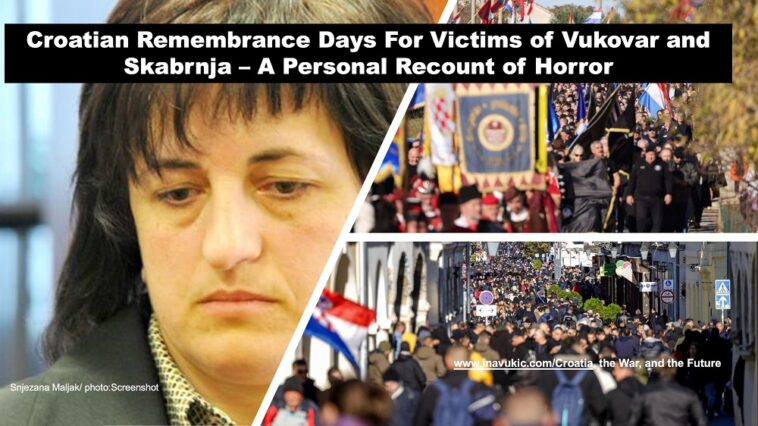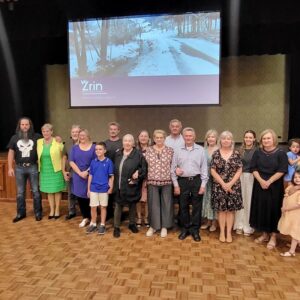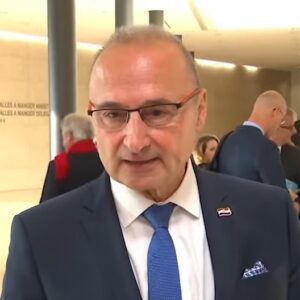While there are in Croatia four days (17, 18, 19, and 20 November 2023) that are set aside for marking remembrance and tributes to those who perished or are still missing from Croatia’s 1990’s Homeland War that sustained unimaginable brutality by the hands of Yugoslav Army and Serb aggression it was November 18 that dawned with the greatest ever gatherings of people paying respect to the victims that Croatia had ever seen. It was the day of remembrance of the multitudes victims of Vukovar and Skabrnja, civilian Croatian victims of massacres and slaughters and the once utterly destroyed and gutted and ethnically cleansed of Croats by Serbs, town of Vukovar, saw over 150,000 people in its procession of special piety of people from all over Croatia and abroad who came there to pay respects and give tribute to those who gave their lives so that Croatia could be free from communist Yugoslavia. Thousands came to the coastal village of Skabrnja as well.
Lest We Forget!
I will pay my tribute to the memory of victims of Croatia’s Homeland War by offering here a translation into English of personal victim account published on the Croatian portal dnevno.hr on 16 November 2023. It is good to know that this personal account and story of suffering under the brutal power of Serb aggression is also the essence of Julienne Eden Busic’s 2012 acclaimed book “Living Cells”
Snjezana Maljak is one of the few women from Vukovar who publicly and in great detail described the days of horror and imprisonment, which in her case lasted for weeks after the fall of the city.
At the same time, she said, she was constantly the victim of rapists, some of whom she knew from before the war, and she also witnessed numerous tortures and killings of her fellow citizens. Although Snjezana Maljak publicly called her tormentors by name for many years, two of them were arrested only in 2018. Other Serb rapists and murderers from this terrible time still roam the streets of Croatia or Serbia or other countries without paying the price for their war crimes! Some, regretfully, were given immunity from prosecution as part of the price Croatia had to pay in 1998 for the region where Vukovar stands to be liberated from Serb occupation!
“I was born and raised in Vukovar, today I am the mother of four children. At the beginning of August, we also went to the seaside in an organised manner, but after about 15 days we would return to the city, they said, it was not dangerous. After a few days, dad receives a threat that all of us will be killed in the house that night, if we stay. With the shooting that followed us, we ran out of the house, across the garden to the next street, and onward,” Dnevno portal wrote that Snjezana Maljak said. The police, she said, came to pick them up and transported them to Mitnica part of Vukovar, to Snjezana uncle’s place, in whose basement they suffered shelling by the aggressor for days.
“My then 3-year-old son had asthmatic bronchitis and we ran out of medication. I went to the hospital on my bike to get the medicine. Now deceased, my neighbour asked me if I would like to be (helping) in the infirmary, for the wounded, if the need arose. I had a small child. There were no others, he told me, either they have left, or they are afraid. I agreed and went back to get my clothes and tell my mother and father. My mother was crying, asking me what she would do with my child if something happened to me.”
The first major attack was on September 5, 1991, when Snjezana’s brother and cousin were wounded, but they managed to defend themselves and hold their position. The second attack, on September 14, 1991, they failed to defend themselves because the enemy attacked with planes and tanks and infantry.
“The (aggressor’s) infantry killed everyone who had anyone in the city’s defence forces or who did not report to them in time that they were in the basement. They killed a deaf elderly neighbour because she did not answer their call. In less than 24 hours, 87 civilians were killed. We haven’t found many – still. Slaughter… The next day they went from house to house and collected the dead. All of them were in Yugoslav People’s Army/JNA uniforms or in camouflage. They had to tie a white cloth on the gate so that it would be known that Croats were there.”
Snjezana Maljak told how they were slaves in the hands of Serbs and Yugoslav Army. People were taken away, imprisoned, killed, women were raped.
“They took me several times for questioning and intimidated me, threatened me. Their Territorial commander, Marko Crevar, took me to my parents’ house, stuck the barrel of a rifle against my back and lead me around the house. Turning things over that had already been turned over. In the room, I saw gold jewellery boxes on the floor, all empty. He took me to the attic and threatened to slaughter my father and brother. Then he threatened to slaughter me too. After a few days, he returned and took me again for questioning. He threatened me again…
Other Serb Chetniks came and threatened, interrogated. S. Samardzija and another from Negoslavci came and took the daughter-in-law away. After they brought her back, she cried and told me that the other one, whose name I don’t know, raped her. The second day, Serb Ivkovic came by and she asked for help. He told her that he would only help her because she was a foreign citizen. She asked him to take me out of town with her. No, he said, she’s going to Petrova Gora, to a party. On October 2, 1991, three people arrived, one of them was a local, M. Samardzija, the father of my schoolmate, and I didn’t know the other two. They summoned my cousin, took him away and thrashed him along the road. After a while they came back for us…
They took us across the garden to the neighbouring street, my street. The younger Chetnik (Serb) said that I was his prisoner, offered me a cigarette and looked at me meaningfully, while the older one put a gun to my cousin’s forehead and said that he would kill him because he looked like Franjo Tudjman (Croatia’s first President). They took us to the headquarters for questioning. The host asked me if I knew that his daughter died. I knew. He said he would kill 60 24-year-olds for her…
Interrogation proceeded in the basement, they pushed us out and beat the neighbour. Everything could be heard. By beating him, they forced him to admit that he fed the Ustashas (Croats) and that he was a “Tudjman supporter” himself. When they opened the door, blood was dripping from the neighbour’s mouth, his jaw was out, he raved deliriously. The younger one grabbed my hair and yelled at me telling me to tell him where the radio station was, or I’ll end up like my neighbour. They took him behind the house and slaughtered him. The host went to get more women.”
After interrogation, the neighbours and Snjezana Maljak were taken to a house basement:
“Everything smelled of urine and dampness. My cousin was taken to the unknown. The second day they took us to Velepromet (Serb concentration camp Vukovar), again questioning, threatening. They put us in one building and order that we be under guard. On October 13, 1991, the one who said I would be at a party in Petrova Gora came and said to me, ‘baby, tomorrow you will do my laundry.’ The next day he came to pick me up and took me away. After I had done the laundry, he ordered me to take a bath, and then to take off my clothes. I asked him not to do that, I had known him since I was a child, I cried. He said either me or ten others and then shooting. After he had done what he wanted, he took me back to the building near Velepromet. I screamed and vomited. My neighbour held me and comforted me, asking me to be quiet, because the walls ‘have ears’. A woman who was raped two houses away also heard my screams.”
After a few days, three more reservists came. One of the women called Snjezana to come out of the room and whispered that she had to choose one of them.
“For me, it was the end of the world, everything was spinning and everything was black. I felt like I was splitting in half. As forced I pointed to one of them. He came every day and took me to the house that was owned by a Serbian woman, one of their reservists, and behaved as if I were his property. I was disgusted, I suffered and waited for the day when I will come to my son, because the easiest thing was to say no and for them to kill me, but I wanted to live, I wanted to see my child…”
After the fall of the city of Vukovar on 18 November 1991, Snjezana Maljak was looking for her child, parents, and sister; she knew nothing of their destiny. The first rapist told her that her child was in Velepromet, and her father was killed behind the hangar. She asked the other rapist to take her to Velepromet to look for the child, but she did not find anyone there.
“The other two women left, one was taken to Sremska Mitrovica, and the other found her family members at Velepromet, and the Serb who raped me was helping her to go with them. They wanted to confuse us by playing good and bad. There was no one to help me. I was left with the Serbian woman to whose house the rapist took me, she said I could stay with her. There, I experienced the hell of drunken Chetniks who celebrated the fall of the city and use me for their survival – tying me to a chair, shining a flashlight into my eyes, using drugs and threats, rape. They called me an Ustasha whore.
“Years pass, I try to live normally, have a family. I am receiving medical treatment. I tried to commit suicide, because I had no one to tell how much all the horrors I had experienced were eating me up. No one asks me how I am and if I need anything…”
(Prepared and translated from the Croatian language by Ina Vukic)





Komentari